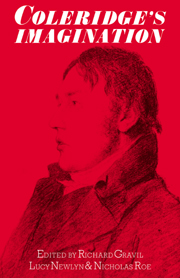Book contents
- Frontmatter
- Contents
- Pete Laver: a memoir
- Abbreviations
- Introduction
- Romantic imagination, nature and the pastoral ideal
- ‘The infinite I AM’: Coleridge and the Ascent of being
- Struggling with the contingent: self-conscious imagination in Coleridge's notebooks
- Coleridge's rejection of nature and the natural man
- The imagination of Mrs Samuel Taylor Coleridge: unknown inspiration of an unknown tongue
- ‘As much diversity as the heart that trembles’: Coleridge's notes on the lakeland fells
- ‘Leaping and lingering’: Coleridge's lyrical ballads
- ‘Radical Difference’: Coleridge and Wordsworth, 1802
- Imagining Wordsworth: 1797–1807–1817
- The Otway connection
- Imagining Robespierre
- Coleridge's Dejection: imagination, joy and the power of love
- Imagining naming shaping: stanza VI of Dejection: an Ode
- Mythopoesis: the unity of Christabel
- The languages of Kubla Khan
- Notes on the contributors
- Index
‘The infinite I AM’: Coleridge and the Ascent of being
Published online by Cambridge University Press: 04 August 2010
- Frontmatter
- Contents
- Pete Laver: a memoir
- Abbreviations
- Introduction
- Romantic imagination, nature and the pastoral ideal
- ‘The infinite I AM’: Coleridge and the Ascent of being
- Struggling with the contingent: self-conscious imagination in Coleridge's notebooks
- Coleridge's rejection of nature and the natural man
- The imagination of Mrs Samuel Taylor Coleridge: unknown inspiration of an unknown tongue
- ‘As much diversity as the heart that trembles’: Coleridge's notes on the lakeland fells
- ‘Leaping and lingering’: Coleridge's lyrical ballads
- ‘Radical Difference’: Coleridge and Wordsworth, 1802
- Imagining Wordsworth: 1797–1807–1817
- The Otway connection
- Imagining Robespierre
- Coleridge's Dejection: imagination, joy and the power of love
- Imagining naming shaping: stanza VI of Dejection: an Ode
- Mythopoesis: the unity of Christabel
- The languages of Kubla Khan
- Notes on the contributors
- Index
Summary
The main sections of Biographia Literaria were written – in fact largely dictated – in the summer of 1815. Within three years Coleridge was looking back on the work, and rejecting it as pantheist. His letter to J. H. Green of September 1818 lies about how much Schelling he had known at the time of writing, but makes the very interesting statement:
I was myself taken in by his system, retrograding from my own prior and better lights, and adopted it in the metaphysical chapters of my Literary Life …
(CL, iv, p. 874)Two months later he commented to C. A. Tulk about Schelling:
as a System it is little more than Behmenism, translated from visions into Logic and a sort of commanding eloquence: and like Behmen's it is reduced at last to a mere Pantheism …
(CL, IV, p. 883)The presence of Schelling in the metaphysical chapters of Biographia is well attested. Coleridge might choose to tell Green that he had known ‘little or nothing of any of his works, excepting his Transcendental Idealism’ (CL, iv, p. 874), but scholars concerned with the issue of plagiarism – the poet's nephew and daughter among the first, in 1847 – have listed up to a dozen Schelling volumes and individual tracts on which he drew. Norman Fruman in The Damaged Archangel (1971) not only brought out the extent of these unacknowledged borrowings – often running to several pages of verbatim translation – but revealed to a queasy Coleridge establishment the pains taken to deceive the reader into believing the material was original.
- Type
- Chapter
- Information
- Coleridge's ImaginationEssays in Memory of Pete Laver, pp. 22 - 52Publisher: Cambridge University PressPrint publication year: 1985
- 1
- Cited by



